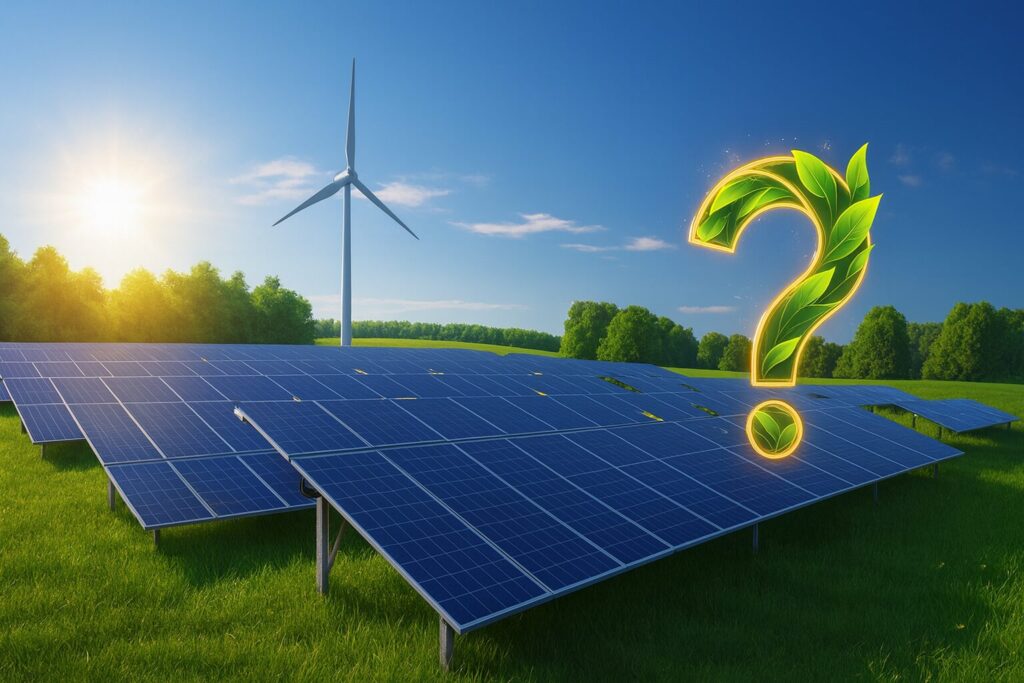
If you have been thinking about solar power, you may have asked yourself: Is solar energy renewable or nonrenewable? The short answer is that solar energy is renewable. The sun provides a virtually limitless supply of energy, and as long as it shines, we can harness it.
However, the answer has more layers. While solar power is renewable by definition, the process of manufacturing and maintaining solar panels does involve some nonrenewable resources. This guide explains what makes solar renewable, how it compares to nonrenewable sources, and why it remains one of the best energy solutions for a sustainable future.
What Does Renewable vs Nonrenewable Mean?
Before answering fully, it helps to clarify the difference between renewable and nonrenewable energy sources.
- Renewable energy: Comes from natural sources that replenish themselves on a human timescale. Examples include solar, wind, hydropower, and geothermal.
- Nonrenewable energy: Comes from sources that will eventually run out. Examples include coal, oil, natural gas, and uranium for nuclear power.
| Type of Energy | Examples | Depletion Risk | Environmental Impact |
|---|---|---|---|
| Renewable | Solar, wind, hydro, geothermal, biomass | Essentially limitless | Low emissions, sustainable |
| Nonrenewable | Coal, oil, natural gas, uranium | Finite, can be depleted | High emissions, pollution, and habitat destruction |
Why Solar Energy is Renewable
Solar energy is renewable because:
- Its source is the sun. The sun has an expected lifespan of about 5 billion more years, making solar energy practically inexhaustible.
- It is globally available. Any location that receives sunlight can produce solar energy, though efficiency depends on climate and geography.
- It replenishes daily. Unlike fossil fuels, solar power does not need to be mined or drilled.
Common Misconceptions: Is Solar Ever Nonrenewable?
Some confusion exists because solar power requires technology that is made with nonrenewable resources.
- Panel manufacturing: Materials like silicon, silver, and aluminum are used in solar panels. Mining these resources relies on nonrenewable processes.
- Energy input: Manufacturing and transporting panels consume fossil fuel energy.
- Panel lifespan: Most solar panels last 25 to 35 years. At the end of life, recycling and reuse efforts are crucial to keep solar sustainable.
Despite these factors, the energy solar panels produce over their lifetime is many times greater than the energy it takes to manufacture them. Recycling technologies are also improving, making solar increasingly sustainable.
Advantages of Solar as a Renewable Energy
Solar power is not just renewable, it also comes with major benefits:
- Reduces dependence on fossil fuels
- Cuts greenhouse gas emissions
- Helps stabilize energy costs for homeowners
- Creates jobs and stimulates local economies
- Pairs with battery storage for reliable power day and night
Comparing Solar to Other Renewable Sources
- Solar vs Wind: Both are renewable, but solar is more predictable in residential settings, while wind requires specific locations.
- Solar vs Hydro: Hydropower is powerful but depends on rivers and large infrastructure. Solar can be installed almost anywhere.
- Solar vs Geothermal: Geothermal is reliable but geographically limited, while solar has broader applications.
Future Outlook for Solar
The future of solar is promising:
- Efficiency is rising. New solar panel technologies are surpassing 23 to 25 percent efficiency.
- Storage is improving. Pairing solar with home batteries allows energy use even when the sun is down.
- Recycling advancements. Companies are developing better ways to recover valuable materials from retired panels.
Together, these trends make solar not only renewable but also more sustainable over time.
Conclusion
So, is solar energy renewable or nonrenewable? Solar is renewable because its source, the sun, cannot run out in any meaningful human timeframe. While manufacturing solar panels involves nonrenewable materials, the overall system provides clean, reliable, and long-lasting energy.
For homeowners, switching to solar is more than a smart financial decision, it is a step toward reducing reliance on fossil fuels and supporting a cleaner energy future.
If you are ready to explore solar for your home, NRG Clean Power can help guide you through the process, from panel selection to installation.

